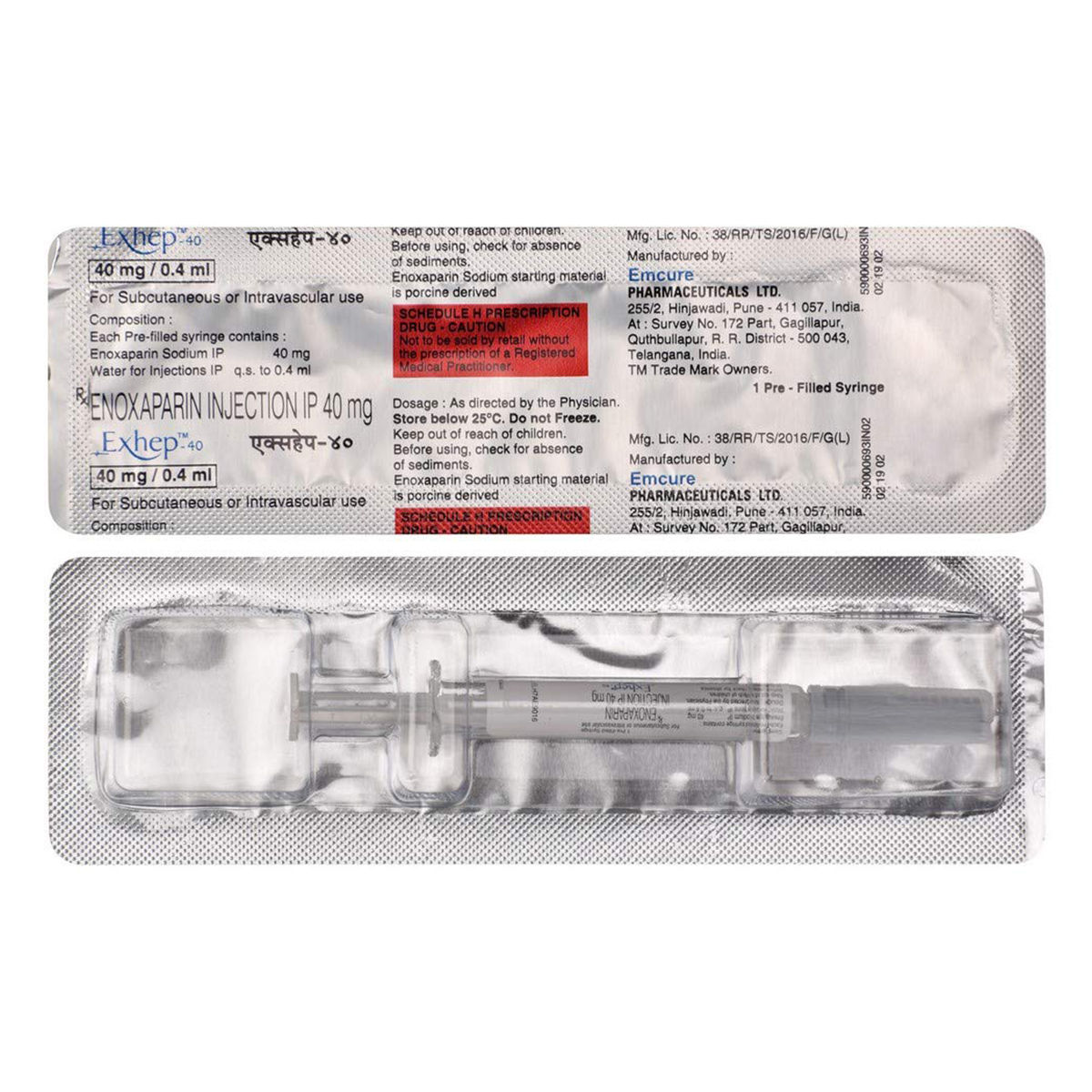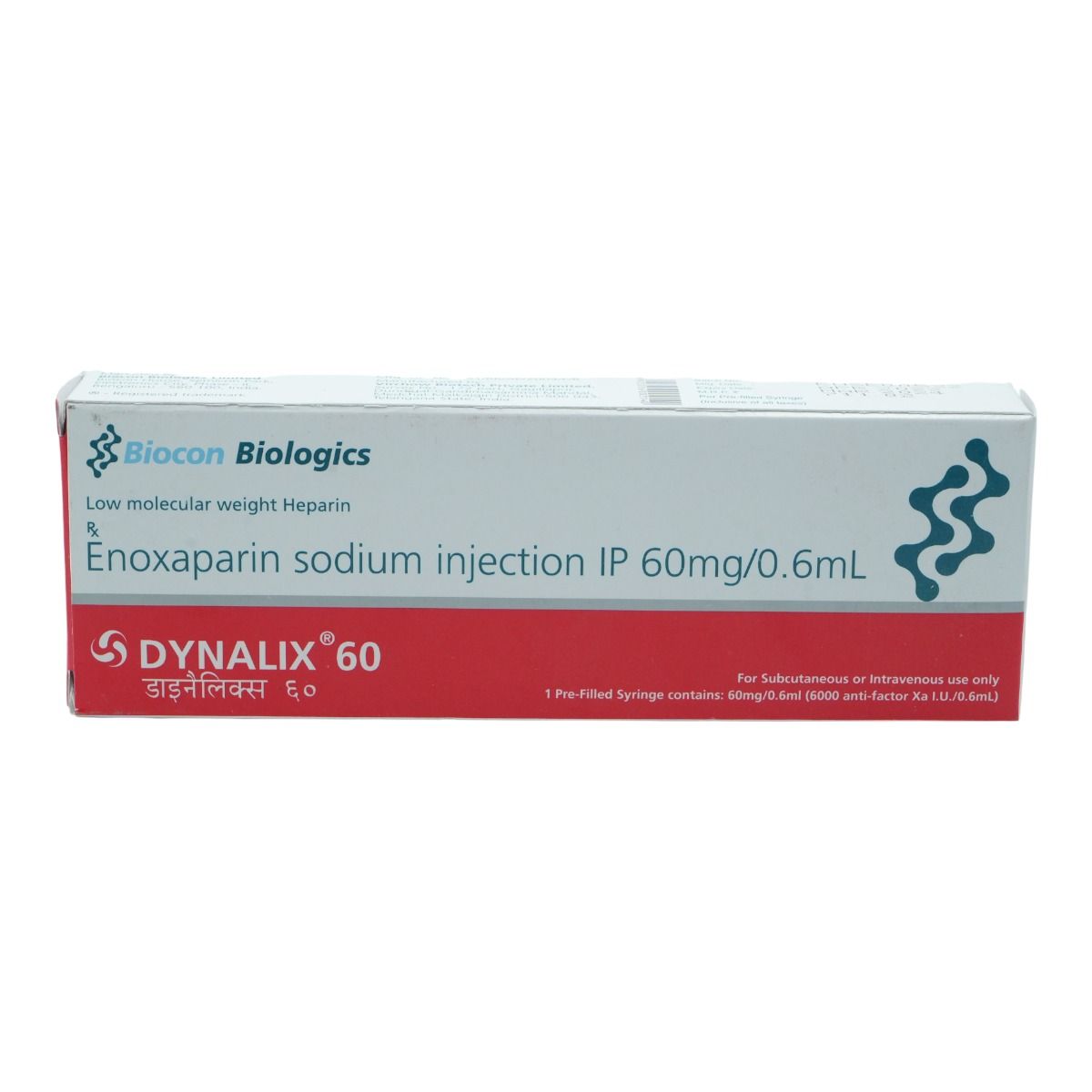Enoxaparin
About Enoxaparin
Enoxaparin is used to prevent or treat blood clots caused by medical conditions, such as unstable angina, after an operation or long periods of bed rest due to illness, after a heart attack, and the formation of blood clots in the dialysis machine tubes. A blood clot is a mass of blood that forms when platelets, proteins, and cells in the blood stick together. A blood clot can occur in any body part, leading to a heart attack, stroke, and organ damage (even coma or death).
Enoxaparin contains Enoxaparin, which is a low molecular weight heparin that works by preventing existing blood clots from growing larger, allowing your body to break them down and prevent them from harming you. On the other hand, it inhibits the formation of new blood clots in your blood.
Enoxaparin will be administered by a healthcare professional; do not self-administer. Side effects of Enoxaparin include increased liver enzymes, skin rash (hives, urticaria), itchy red skin, bruising or pain at the injection site, and headache. Most of these side effects do not require medical attention and gradually resolve over time. However, if the side effects are persistent, report to your doctor immediately.
If you are known to be allergic to Enoxaparin or any other medicines, inform your doctor. If you are pregnant or breastfeeding, it is advised to inform your doctor before receiving the Enoxaparin. Also, disclose to your doctor if you have any pre-existing medical conditions like a stomach ulcer, recent surgery of the brain or eyes or spine, recent bleeding stroke, diabetes, high blood pressure, or recent onset of stroke or kidney or liver disorders. Also, let your doctor know if you are underweight or overweight or if you have high levels of potassium in your blood.
Uses of Enoxaparin
Medicinal Benefits
Enoxaparin contains Enoxaparin, which is a low molecular weight heparin (LMWH) that helps to treat harmful blood clots due to medical conditions, including unstable angina, after an operation or long periods of bed rest due to illness, after a heart attack, and blood clots forming in the tubes of your dialysis machine. Enoxaparin works by stopping existing blood clots from getting any bigger; this helps your body break them down and prevents them from causing you harm. On the other hand, it stops new blood clots from forming in your blood.
Directions for Use
Storage
Side Effects of Enoxaparin
- Bleeding
- Increases in liver enzymes
- Bruise more easily than usual
- Pink patches on your skin
- Skin rash (hives, urticaria)
- Itchy red skin
- Bruising or pain at the injection site
- Decreased red blood cell count
- High platelet counts in the blood
- Headache
Drug Warnings
Patients should inform the doctor if they are on active treatment with this Enoxaparin before any surgery is scheduled. If you are known to be allergic to Enoxaparin or any other medicines, inform your doctor. If you are pregnant or breastfeeding, it is advised to inform your doctor before using the Enoxaparin. Before using this Enoxaparin, disclose to your doctor if you have any pre-existing medical conditions like stomach ulcer, recent surgery of the brain or eyes or spine, recent bleeding stroke, diabetes, high blood pressure, or recent onset of stroke or kidney or liver disorders, And also let your doctor know if you are underweight or overweight or if you have high levels of potassium in your blood.
Drug Interactions
Drug-Drug Interactions: Enoxaparin may have Interaction with pain killers (e.g. aspirin, ibuprofen), blood thinners (e.g. heparin, warfarin, rivaroxaban), medicines used as a blood replacer (e.g. dextran injection), drugs used to treat asthma (e.g. prednisolone, dexamethasone), medications which increase potassium levels in your blood such as potassium salts, water pills, and some medicines for heart problems.
Drug-Food Interactions: Enoxaparin may interact with alcoholic beverages, so avoid the consumption of alcoholic beverages.
Drug-Disease Interactions: Enoxaparin may interact with various disease conditions, including haemophilia (clotting disorder), liver disease, peptic ulcer disease, retinopathy, subacute bacterial endocarditis (an infection that occurs to heart valves), active bleeding (bleeding problems), hypertension, renal dysfunction, thrombocytopenia (deficiency of platelets), prematurity, hypertension and kidney disease.
Drug-Drug Interactions Checker List:
Safety Advice

Alcohol
cautionLimit intake of alcohol as it may increase the risk of bleeding.

Pregnancy
cautionEnoxaparin is not recommended for use in pregnancy unless clearly necessary. So, inform your doctor if you are pregnant or suspect pregnancy. Your doctor will weigh the benefits and potential risks before prescribing Enoxaparin.

Breast Feeding
cautionEnoxaparin is not recommended for use in breastfeeding unless clearly necessary. So, inform your doctor if you are a nursing mother. Your doctor will weigh the benefits and potential risks before prescribing Enoxaparin.

Driving
safe if prescribedIt does not affect your ability to drive.

Liver
cautionIf you have a history of liver diseases or pre-existing liver conditions, please inform your doctor before taking this Enoxaparin. Your doctor will prescribe only if the benefits outweigh the risks.

Kidney
cautionIf you have a history of kidney diseases or pre-existing kidney conditions, please inform your doctor before taking this Enoxaparin. Your doctor will prescribe only if the benefits outweigh the risks.

Children
unsafeIt is not recommended for treatment in children under 18 years of age as safety and efficacy have not been established.
Habit Forming
Diet & Lifestyle Advise
- A low cholesterol diet and a regular exercise regime complement treatment with Enoxaparin effectively.
- As a precautionary measure, you are recommended not to consume alcohol, or junk food items from outside, stick to a freshly prepared home-cooked meal and rest properly for a speedy recovery.
- And also, trying to replace most of your saturated fats with unsaturated fats can reduce total cholesterol and LDL in a short time.
- Foods like avocados, olive oil, fatty fish, and nuts contain many heart-healthy unsaturated fats, so eating them regularly is beneficial.
- Option for foods high in vitamin K (liver, leafy green vegetables, or vegetable oils) as Enoxaparin may lower Vitamin K in your body.
- Avoid drinking alcohol as it increases the risk of gastrointestinal ulcer/bleeding.
- Cranberry juice, grapefruit juice, noni juice, and pomegranate juice may interact with Enoxaparin and lead to unwanted side effects. Hence try to avoid these juices while taking Enoxaparin.
Special Advise
Regular blood tests are advised while taking Enoxaparin to monitor prothrombin, platelets, and coagulation time on a regular basis.
Patients Concern
Disease/Condition Glossary
A blood clot can occur in any part of the body, leading to a heart attack, stroke, and damage to organs (even coma or death). Blood clots can reach your arteries or veins in organs like the brain, kidney, heart, lungs, and limbs. Conditions like atherosclerosis, diabetes, heart failure, irregular heartbeat (arrhythmia), and obesity/overweight can trigger excessive blood clotting in the brain and heart. On the other hand, deep vein thrombosis (blood clot in veins), peripheral artery disease (narrowed arteries due to fat deposit or blood clot), and atherosclerosis (fat built upon the walls of the arteries) can cause a blood clot in your limbs.
FAQs
Enoxaparin is used to prevent or treat blood clots caused by medical conditions, such as unstable angina, after an operation or long periods of bed rest due to illness, after a heart attack, and the formation of blood clots in the dialysis machine tubes.
Enoxaparin contains Enoxaparin, which is low molecular weight heparin or LMWH. Enoxaparin works by stopping existing blood clots from getting any bigger. This helps your body to break them down and prevents them from causing you harm. On the other hand, it stops new blood clots from forming in your blood.
Yes, this Enoxaparin is given based on your age and body weight. If you have low body weight, the chances of increased risk of bleeding are high, so mostly low doses are prescribed by your doctor. You may be monitored closely for signs of clot formation.
No, do not take this Enoxaparin if you have a stomach ulcer. Please inform your doctor about this condition before receiving it.
Yes, Enoxaparin may cause bleeding. If you notice purple spots on the skin or unusual bruising, blood in urine, black tarry stools, or unusual bleeding from the gums or nose, please inform your doctor immediately as these are signs of bleeding more easily.
Increases in liver enzymes are the most common side effect with Enoxaparin. Regular lipid profile tests are recommended to avoid any additional complications.
Enoxaparin typically starts showing its effect within 1 to 2 hours and it remains in the body for about 12 hours.
No, Enoxaparin dosage should be given exactly as prescribed by the doctor.
Enoxaparin contains Enoxaparin as it active ingredient.
Enoxaparin is mostly prescribed for angina (chest pain), deep vein thrombosis (blood clot in veins) and as a post-surgery precautionary step.
Yes, there are many substitutes available in the market. However, please note that all these substitutes have the same composition and thus should be administered with the same set of precautions.
Enoxaparin will be administered by a doctor or nurse in the hospital or clinic. Do not self-administer.
Bleeding is one of the side effects of Enoxaparin in some individuals. If you experience any kind of unusual symptoms such as black tarry stool, unusual bleeding, etc., inform the doctor immediately.
The side effects of Enoxaparin include bleeding, increases in liver enzymes, bruise more easily than usual, pink patches on your skin, skin rash (hives, urticaria), itchy red skin, pain or bruising at the injection site and headache. If these side effects persist or worsen, please inform your doctor.
The dose and duration of Enoxaparin is prescribed by a doctor based on the underlying condition and the patient’s response to the treatment.
Enoxaparin is injected beneath the skin. Fix the medicine dose and make a fold by pinching the skin of your stomach between your finger and thumb. After cleansing the area, hold the syringe like a pencil and insert the full length of the needle into the skin fold. Inject Enoxaparin and discard the syringe as instructed by your doctor. Follow the instructions given by the doctor strictly. In case of any doubt or any reactions associated with the medicine, contact your doctor.
Tell your doctor if you have a heart valve fitted or have high blood pressure, gastric ulcer, kidney problems or diabetes. Also, let your doctor know if you ever had a reaction to heparin or had a recent stroke, spinal or brain surgery. The chances of complications and side effects increase in these conditions.
Store Enoxaparin below 25°C. Do not freeze. Keep it out of reach and sight of children.
Yes, Enoxaparin is used in the treatment of heart attack and chest pain once the patient has received the standard treatment. It is administered along with another blood thinner like aspirin. As it is a blood thinner, it prevents the blood from clotting and prevents any further episodes and complications.
Yes, you can push the air bubbles into the injection site. Removing the air bubbles causes loss of the medicine thereby changing the prescribed dose.







